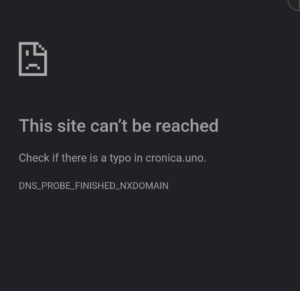In Venezuela, digital information freedoms are systematically censored and attacked, according to “Algorithms of Silence,” the 2023 Digital Rights Report from the Press and Society Institute of Venezuela (IPYS Venezuela, for its acronym in Spanish).
According to the report, 46 national and international media outlets, as well as sites of civil organizations and platforms, are blocked by the country's main internet providers.
In addition, during 2023, IPYS Venezuela recorded 128 violations of freedom of expression in the digital sphere, which affected media, journalists, citizens and civil society organizations. Some of these violations include cyber threats, identity impersonation on social networks, harassment, smear or disinformation campaigns, hacks, etc.
“The particular thing about this year in the digital environment is that obviously there are still state decisions and policies to censor. It has not been enough for the State to close traditional media and television stations, to suffocate and completely eliminate print media, to close dozens of hundreds of radio stations throughout the territory, but now it is targeting digital media by blocking them,” Yhoger Contreras, coordinator of Alert Monitoring at IPYS Venezuela and the person in charge of this report, told LatAm Journalism Review (LJR).
The blocking is applied by telecommunications companies, both public and private, by orders of the national executive, according to IPYS Venezuela and various international and national organizations. According to the report, the most common are DNS (Domain Name System) blockings. This method prevents a device using a specific connection from being able to find the IP address of a specific web page. Also common is the blocking of the hypertext transfer protocol (HTTP). In this method, a mechanism intercepts the flow of web traffic and denies the connection with the server the user is trying to reach.
The user only sees a message on their screen, each time they try to enter, indicating that the web page is not available or that access has been denied.
The report also highlights inequalities of internet access that exist in Venezuela due to electricity outages and high service costs.

The digital blocking is applied by telecommunications companies, both public and private, by orders of the national executive, according to IPYS Venezuela and various international and national organizations (Photo: Screenshot)
“The digital divide in Venezuela continues to widen and part of this is due to the limited progress in infrastructure and internet access. Although there is an increase in the offer of services by providers, high costs, limited coverage in remote areas, power outages, the economic crisis and the lack of public policies make universal access to this right, which is crucial for the exercise of other rights, increasingly unattainable for citizens,” the report said.
To reach these conclusions, as indicated in the report, the IPYS Venezuela alert monitoring team did follow-up and evaluation work, with the support of its National Network of Correspondents, made up of practicing journalists present in the country’s 20 states. In addition, they consulted various primary sources, available public documents and digital rights experts present in Venezuela.
Identity impersonation
Independent media outlets in Venezuela have not sat idly by and have looked for various ways to circumvent censorship. From looking for other digital alternatives, such as using social networks or messaging applications, to distributing the information physically.
“We launched a campaign to teach our audience what a VPN is, how to download it, how to install it and how from that they could see the content of the page,” Ivanna Laura Ordoñez, journalist for Venezuelan media outlet Crónica.Uno, told LJR.
VPN means “Virtual Private Network” and is a tool that allows you to hide the data that is sent or received over the Internet, so that it is inaccessible to third parties who try to intercept the connection. The VPN allows you to virtually change the location of the device connected to the internet and thus bypass geographic digital blocks.
“But, it is very difficult to make people, especially older people, understand how the VPN works. In addition, our content focuses on vulnerable communities where there is often no internet,” she added.
The solution that the Crónica.Uno team has found is to create mirror websites –which can be viewed without using a VPN– to continue sharing content with the audience. They also sometimes send articles in PDF through WhatsApp.
Independent Venezuelan media have found an alternative in WhatsApp to continue informing the public. For example, forum chats have gained popularity in the country since the COVID-19 pandemic, due to the inability of holding events in person and the poor internet service that sometimes makes it impossible to play live videos.
However, as IPYS Venezuela explained in its report, the use of this tool exposes media and their journalists to possible identity impersonation.
Identity impersonation was the most frequent violation in the digital environment during 2023, according to “Algorithms of Silence.” This is despite the fact that it is the first time that this category has been added to the registry.
According to the report, 12 media outlets and four journalists were affected by this kind of cyberattack, which is characterized by IPYS as “effective and dangerous.”
IPYS Venezuela identified three forms of identity impersonation. Most commonly, it is executed with the purpose of scamming or stealing personal information, known in digital terms as phishing.
“These spaces have led unknown actors, who seek to scam, to enter the [WhatsApp] groups where the media disseminate information. From there, they capture the contact numbers of the users, change the graphic identity of their WhatsApp profiles to simulate that of the media outlet and then make calls through WhatsApp to the members of the groups under the pretext of asking them for their [WhatsApp] code in exchange for allowing them to stay on the news channel,” Contreras explained.
This practice happened in groups created by media outlets El Pitazo, El Nacional, Radio Fe y Alegría Noticias, Red Digital Noticias (RDN), Venezuela Al Minuto, Correo del Caroní, Qué Pasa En Venezuela, Noticia y Punto and Noticias Apure.
Secondly, there is identity impersonation carried out for the purposes of disseminating disinformation. A notorious case was that of journalist and activist Melanio Escobar. According to the report, groups aligned with the government manipulated content published on Escobar's networks and shared it in order to make people believe that the journalist supported a Consultative Referendum that took place in the country on Dec. 3, 2023.
IPYS also recorded a third group of cases in which identity impersonation was carried out with the aim of undermining the credibility of journalists.
It happened to Armando.info journalist Roberto Deniz. Unknown people created emails to impersonate him and make requests to third parties. Deniz has been investigated by the Venezuelan prosecutor's office and forced into exile for his revelations about the business network of Alex Saab, the government's financial operator and alleged front man for Maduro.
Election year and recommendations

Groups aligned with the government manipulated content published on journalist and activist Melanio Escobar's networks and shared it in order to make people believe that the journalist supported a Consultative Referendum in Venezuela. (Photo: Screenshot)
Many of the media blockings recorded in the report are recurring –that is, they've been going on for years. However, during 2023, blockings were identified against three new media and organization sites. The websites of El Carabobeño, El Diario and Observatorio Venezolano de Finanzas are partially blocked through the main internet providers in the country.
“Many of the blockings recorded in Venezuela occurred because of some type of publication, investigation or in-depth report that has not been well received by State actors,” Contreras said.
According to the report, another increasingly recurring element is the use of public media or State social media accounts to create disinformation campaigns or to criminalize the press. This situation could increase during 2024, considering that it is an election year in Venezuela, according to Contreras.
“Since it is an election year, there is a very strong line of censorship and self-censorship, leading to increasingly poor debate, with the participation of fewer actors with fewer possibilities to verify information,” Contreras said.
The report ends by giving recommendations to journalists and media outlets with the aim of protecting, promoting and guaranteeing the exercise of human rights in digital environments. IPYS Venezuela recommends that in addition to following the bases of journalistic ethics and rigor, journalists take the necessary cybersecurity measures to safeguard information and digital files, thus guaranteeing the protection of information sources.